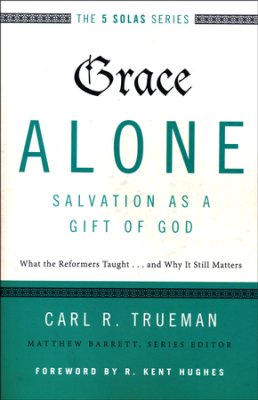Also in TGC’s series on the Reformation’s five solas:
- Sola Scriptura Demands Inerrancy (Matthew Barrett)
- Justification = Faith + Nothing (Thomas Schreiner)
As we look back to the sola gratia cry of the Reformation, it is helpful to ask ourselves: What would a “grace alone” church look like today? What would characterize its life as a church? How might we recognize such a church when we see it?
The answer to these questions falls into two parts: doctrinal and practical. But these parts are closely connected. Here, I offer 10 points that show the interconnection and give hints as to the identity of a sola gratia church. A grace-alone church . . .
1. Takes sin seriously.
Grace is not simply a sentiment or attitude in God. It is God’s concrete response to human sin. This means a proper understanding of grace depends on a prior, proper understanding of sin and the human predicament.
No grace-filled church will be unclear about the problem grace is meant to address.
If we attend church to feel good about ourselves or to learn some tips on how to live better, we are missing the point. Such attitudes indicate that we see the human problem as one of human psychology or a lack of knowledge. We fail to see where the real issue lies. Until we see sin as the problem, we won’t understand the nature of God’s prescribed solution. No grace-filled church will be unclear about the problem grace is meant to address.
2. Takes Christ seriously.
If sin is the problem, grace is not simply God’s benevolent decision to ignore it and pretend the fall never happened. Grace in the Bible, and among the greatest exponents of grace in the history of theology, is embodied in the Lord Jesus Christ. Grace is God’s action to deal with sin, in Christ and in the application of Christ to the individual by the Holy Spirit.
If we speak of grace without speaking the name of Christ, we aren’t speaking biblically of grace. . . . Christless talk is graceless talk.
A grace-alone church will not just talk about grace; she will talk about Christ. If we speak of grace without speaking the name of Christ, we are not speaking biblically of grace. In the Bible, grace is so intimately connected to Christ that Christless talk is graceless talk.
3. Takes God’s priority in personal salvation seriously.
Predestination remains a contentious topic within the church, as ongoing debates within the Southern Baptist Convention, for example, indicate. The emphasis on the sovereignty of God’s grace we find in men such as Augustine and Calvin represents an important and non-negotiable aspect of the Christian gospel.
This side of glory we won’t be able to answer all the questions the doctrine of predestination raises, but Paul’s doxological statement in Romans 9 indicates that he, too, was acutely aware of the limits of human speculation in this matter. There comes a point when we must stop theologizing and speculating and simply declare God’s glory. A grace-alone church will be one that unashamedly declares God’s sovereign priority over all of creation and his sovereign priority over the church and her people. Only in this way can ministers preach with confidence, knowing that it is not their eloquence that saves but the Spirit using the Word to bring people to Christ. Only in this way can pastors confidently counsel people, knowing that, whatever the problem may be, our sovereign, gracious God is in control.
4. Takes assurance seriously.
This was the point where the Reformers broke from the earlier anti-Pelagian tradition on grace. For them, God’s sovereign grace meant Christians could be confident that God was their God and would love and care for them until they were safely home.
To be able to point Christians to a sovereign God who has revealed himself as gracious in Christ is perhaps the single most important thing that a pastor can do.
This is pastorally crucial. To be able to point Christians to a sovereign God who has revealed himself as gracious in Christ is perhaps the single most important thing that a pastor can do. When the problems of this fallen world close in on us, as they inevitably will, there can be a tendency to see our sin or our suffering or the evil machinations of the world around us as the last word. God’s grace in Christ says otherwise, and the church which takes that grace seriously will constantly point her people to that truth with the aim of reassuring them that, whatever comes to pass, God is both sovereign and gracious.
5. Takes corporate worship seriously.
For the Reformers—as for the early church and medieval fathers—the gathering of the visible church was important. In fact, we can say it was the most important thing for them. Certainly, it was so important for the medievals largely because of their high sacramentalism, something the Reformers rejected. But even so, the Reformers believed that the church was God’s creation, and that it was the place where grace was found through the proclamation of God’s Word and the administration of the sacraments.
We live in age in which church is often regarded as an optional add-on to the Christian faith, or as a place we go to learn the Bible, to make some good friends—a context for social interaction. A church which takes grace alone seriously knows that while all those things may be true, the primary reason we go to church is to receive God’s grace through the Word and sacraments. It is with the gathering of saints on the Lord’s Day that we receive what we need, strengthening us to go about our daily callings for the rest of the week.
6. Takes the Bible seriously.
If we take grace alone seriously then we will inevitably take the Bible seriously. The Bible is God’s revelation of the history and identity of his people, and supremely of his purposes for them as they culminate in Jesus Christ.
Given this, we may need to spend time reflecting on how the Bible functions in our churches. Is time given to the public reading of significant amounts of Scripture in the worship services? Do our sermons bring people back to the Bible again and again and again? Are the public prayers suffused with biblical references and biblical allusions? Do people leave church knowing the Bible better than when they entered?
7. Takes preaching seriously.
Preaching was central to the Reformation because of how the Reformers understood grace. The Word proclaimed is not mere information transfer. Sermons do not simply help people to understand the Bible better. The word brings grace. Confronted with sin, people are either hardened or brought to their knees in repentance, and then presented with Christ, the author and finisher of their salvation.
The pastor needs to follow the Pauline paradigm: proclaim who Christ is, call on congregants to believe on him for salvation, and then press home the need to live according to the identity they have in Christ. Preaching is supernatural. The words of the preacher are taken by the Spirit and applied as the Word of God to the hearts and minds of the congregation. It is God’s primary appointed means of bringing people to faith and of nurturing them in the faith.
8. Takes baptism seriously.
I am an apostate Baptist, now a Presbyterian, and one of the reasons for my move was the conviction that baptism is all about God’s grace, not our response. There are Baptists, for example of the 1689 Confession variety, who agree with me on this. Theologically, I think there is room for those who disagree on the subject of baptism to agree on baptism’s meaning.
Baptism is important. Grace-alone churches should teach about the importance and significance of baptism. Pastors should remind people of their baptism and what it signifies. As Paul would point people back to the fact that they were baptized as the basis for pressing home their new identity in Christ and the great imperatives of the Christian life, so we should do the same.
9. Takes the Lord’s Supper seriously.
If baptism is a means of grace, we can say the same about the Lord’s Supper. The Reformers took the Lord’s Supper very seriously—even allowing their disagreements to split the Protestant movement down the middle. That might have been excessive; but perhaps it would’ve been worse if they’d simply dismissed it as a matter of no importance.
Today we need to recover an understanding of the Lord’s Supper as a means of grace. Yet far too often we find little to no teaching on the Supper in our churches. And when preachers do teach on the Supper, it is more out of a sense of obligation than a proper understanding of why they are doing it. As with baptism, we need to take the celebration of the Supper seriously, and we need to make sure there is proper instruction given to congregants on what the Supper means.
10. Takes prayer seriously.
A church that believes in grace alone will inevitably take prayer seriously, both public and private. This is because a church that takes grace seriously knows she exists only in complete and total dependence on the Lord who bought her.
Such a church will know it is vitally important to call out to the Lord for all things—that conversions, Christian growth, discipleship, and worship all depend on God himself. Like Aquinas, Christians who understand grace know their prayers are one of God’s chosen means for accomplishing his purposes; thus prayer will characterize their lives, corporately and as individuals.
How Sweet the Sound
Grace is a vital doctrine, not simply for the church’s theological confession but also for the church’s theological practice. It is a doctrine with profound theological, existential, and practical consequences.
This is why the idea of salvation by grace alone has spoken so powerfully to believers throughout the ages. It also explains why grace alone came to the fore at particularly critical junctures in church history, such as the fifth century and the Reformation. It exalts God as sovereign, points to the desperate and fallen condition of sinful humanity, and connects the two in the all-sufficient and powerful saving work of the Lord Jesus Christ.
Can there be a sweeter sound than “amazing grace” in the sinner’s ear?
Editors’ note: This is an adapted excerpt from Carl R. Trueman’s Grace Alone: Salvation as a Gift of God (Zondervan, 2017). It is a volume in The 5 Solas Series.
Is there enough evidence for us to believe the Gospels?
 In an age of faith deconstruction and skepticism about the Bible’s authority, it’s common to hear claims that the Gospels are unreliable propaganda. And if the Gospels are shown to be historically unreliable, the whole foundation of Christianity begins to crumble.
In an age of faith deconstruction and skepticism about the Bible’s authority, it’s common to hear claims that the Gospels are unreliable propaganda. And if the Gospels are shown to be historically unreliable, the whole foundation of Christianity begins to crumble.




































